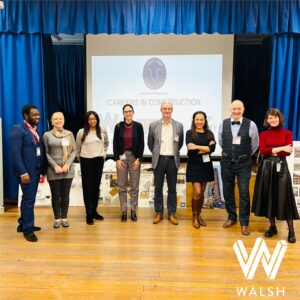Delivering social value and supporting social value initiatives is a crucial part of our business and client approach.
We add social value to client projects in our role as engineers
Smart Engineering Minimises Local Disruption
Construction sites are busy both day and night with commercial and residential areas surrounding them, each with its own community. Protected characteristics of these communities include shift workers, those with caring responsibilities and those with disabilities. These diverse communities are significantly impacted by construction noise and the general disruption around the site. Those who need to sleep during the day will be more affected by construction noise and those with ambulatory limitations will be affected by HGVs and road or footpath closures. By focusing on engineering solutions which are simple, repetitive and easy to build (whilst delivering on the architect’s vision), we can significantly reduce construction duration and therefore the impacts of redevelopment upon the communities surrounding the development site.
Engineering Adaptable Spaces
Engineering has a key role to play in making any development project suitable for a diverse community through considerations around adaptability. Without adding unnecessary expense, Walsh proposes to work with the wider development team to identify the potential uses of various spaces and designing the structure to meet these.
With so much experience in the built environment, we are familiar with the legislation for adaptability such as Part M of Building regulations.
We create social value as a business
We are actively developing our social value strategy and community outreach activities. Below are just a few examples of our social value initiatives:
Employment Opportunities

Schools Outreach

Charitable Fundraising

Women of Walsh
